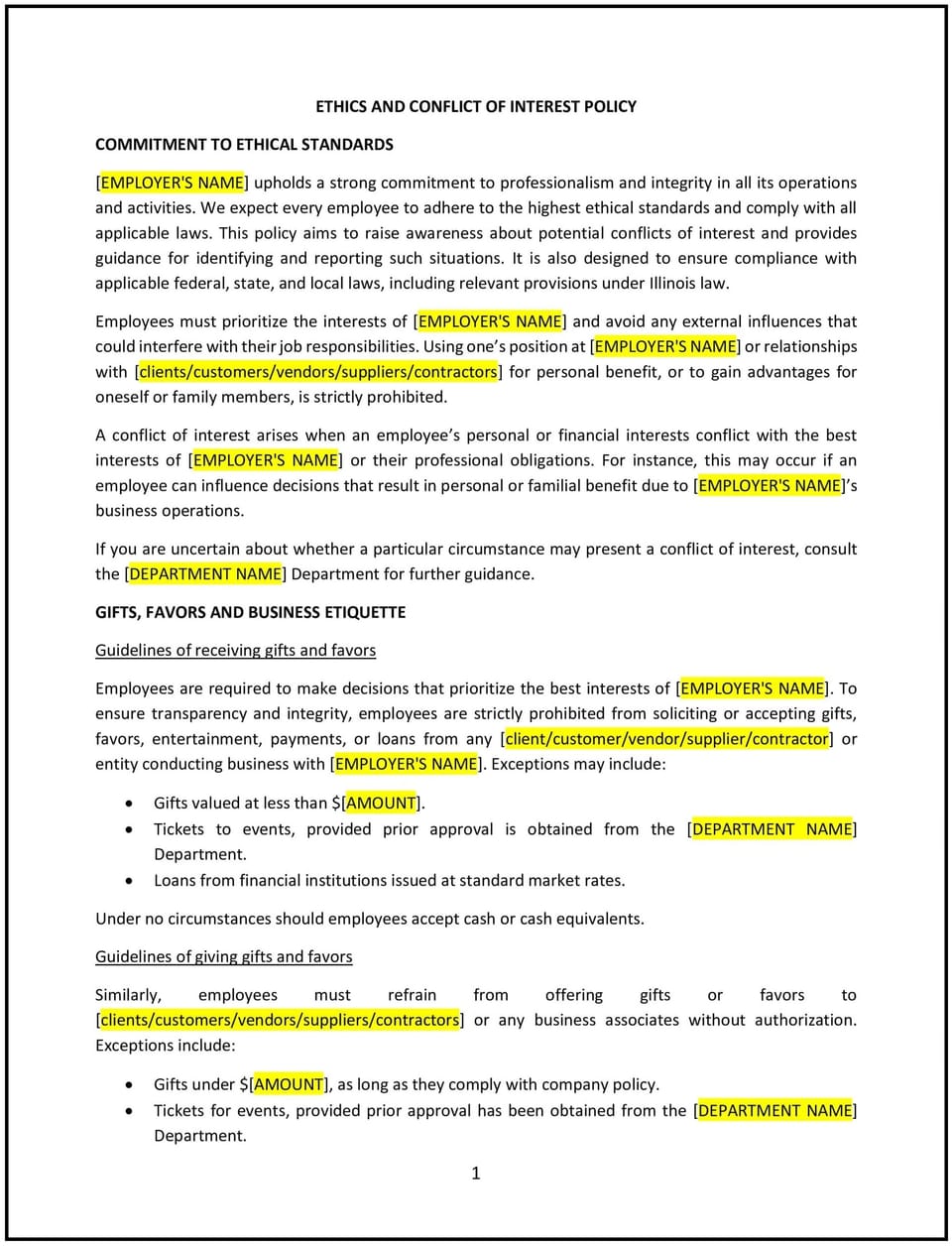Ethics and conflict of interest policy (Illinois): Free template

Ethics and conflict of interest policy (Illinois)
This ethics and conflict of interest policy is designed to help Illinois businesses promote integrity, transparency, and accountability in the workplace. It provides guidelines for ethical behavior, identifies potential conflicts of interest, and outlines procedures for disclosure and resolution to promote compliance with Illinois laws and regulations.
By adopting this policy, businesses can maintain trust, uphold ethical standards, and reduce the risk of reputational or legal harm.
How to use this ethics and conflict of interest policy (Illinois)
- Define ethical expectations: Outline the standards of ethical behavior expected of employees, including honesty, fairness, and compliance with company policies and laws.
- Identify conflicts of interest: Provide examples of potential conflicts, such as personal financial interests, relationships that could bias decisions, or accepting gifts from vendors.
- Require disclosure: Specify that employees must disclose any actual or potential conflicts of interest to their manager or HR immediately.
- Include resolution procedures: Detail how disclosed conflicts will be reviewed and resolved, including measures to mitigate risks.
- Prohibit unethical conduct: Clearly state that behaviors such as bribery, fraud, and insider trading are strictly prohibited.
- Provide training: Offer regular training on ethical behavior and recognizing conflicts of interest.
- Establish reporting mechanisms: Encourage employees to report unethical behavior or unresolved conflicts through designated channels.
- Monitor compliance: Conduct periodic reviews to ensure adherence to this policy and identify areas for improvement.
Benefits of using this ethics and conflict of interest policy (Illinois)
This policy provides several benefits for Illinois businesses:
- Promotes accountability: Encourages employees to act with integrity and responsibility in all business dealings.
- Reduces risks: Mitigates the potential for legal or reputational harm by addressing conflicts and unethical behavior proactively.
- Enhances compliance: Aligns with Illinois laws and industry standards for ethical business practices.
- Builds trust: Demonstrates a commitment to transparency and fairness among employees, customers, and stakeholders.
- Supports decision-making: Provides clear guidance for identifying and addressing conflicts of interest.
Tips for using this ethics and conflict of interest policy (Illinois)
- Communicate the policy: Share the policy with employees during onboarding and ensure it is included in employee handbooks.
- Provide examples: Use real-life scenarios or hypothetical cases to illustrate ethical standards and potential conflicts.
- Encourage transparency: Foster an environment where employees feel comfortable disclosing conflicts or reporting unethical behavior.
- Train managers: Equip managers with the tools to identify and address conflicts or ethical concerns effectively.
- Update regularly: Revise the policy to reflect changes in Illinois laws, workplace practices, or ethical standards.
Q: What is considered a conflict of interest under this policy?
A: A conflict of interest occurs when an employee’s personal or financial interests could interfere with their ability to make impartial decisions in the best interest of the company.
Q: How should employees disclose potential conflicts of interest?
A: Employees must report potential conflicts to their manager or HR immediately, providing all relevant details.
Q: What happens if a conflict of interest is identified?
A: The company will review the disclosure, assess the risks, and implement measures to resolve or mitigate the conflict.
Q: Are employees allowed to accept gifts from vendors?
A: Employees should avoid accepting gifts, favors, or hospitality from vendors that could influence business decisions. Exceptions may apply for nominal gifts, as outlined in the policy.
Q: How are reports of unethical behavior handled?
A: Reports are investigated promptly and confidentially, with appropriate corrective actions taken based on the findings.
Q: What training is provided under this policy?
A: Regular training is offered to employees and managers on ethical standards, recognizing conflicts of interest, and reporting procedures.
Q: How often is this policy reviewed?
A: This policy is reviewed annually or whenever significant changes occur in Illinois laws or workplace practices.
Q: Does this policy apply to contractors and vendors?
A: Yes, contractors and vendors are expected to adhere to the company’s ethical standards when conducting business with the organization.
This article contains general legal information and does not contain legal advice. Cobrief is not a law firm or a substitute for an attorney or law firm. The law is complex and changes often. For legal advice, please ask a lawyer.


